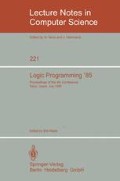Abstract
In this paper we describe a language specification and its implementation of ZERO, a frame-based language, in terms of embedding Prolog into it. ZERO is a general purpose frame-based knowledge representation language and is an extension of FMS which was developed by us. The extension is a feature to handle Prolog programs as attached procedures in the form of a set of clauses which is activated by a message sent from another frame. By combination of Prolog statements (Horn clauses) and Lisp-based procedures, highly flexible intelligent systems could be achieved. The ZERO system has three major features which are developed to embed Prolog into the system; a Prolog-based message passing, an extension of unification mechanisms and a function for nondeterministic behavior by backtracking for a frame system.
This report describes a research done at Tokyo Denki University.
Preview
Unable to display preview. Download preview PDF.
References
Allen B, Write J (1983) Integrating Logic and Schemata. Proc. IJCAI 83, 340–342
Bowen K, Kowalski R (1982) Amalgamating Language and Metalanguage in Logic Programming. In: Clark K, Tarnland S (ed) Logic Programming, Academic Press, New York, 153–172
Brachman R, Fikes E, Levesque H (1983) Krypton: A Functional Approach to Knowledge Representation. Computer, Vol. 16, No. 10, 67–73
Chang C, Lee R (1973) Symbolic Logic and Mechanical Theorem Proving. Academic Press, New York
Chikayama T (1981) UTILISP Manual. University of Tokyo
Clocksin W, Mellish C (1984) Programming in Prolog. Second edition, Springer-Verlag, Berlin
Davis R (1984) Reasoning from First Principles in Electronic Trouble-shooting. In: Coombs M (ed) Developments in Expert Systems. Academic Press, London, 1–21
Deliyanni A, Kowalski R (1979) Logic and Semantic Networks. CACM, Vol. 22, No. 3. 184–192
Harmon P, King D (1985) Expert Systems: Artificial Intelligence in Business. John Wiley and Sons, New York
Hayes-Roth F, Waterman D, Lenat D (1983) Building Expert Systems. Addison-Wesley, Massachusetts
Ito H, Ueno H (1983) Implementation of a Frame-Based Knowledge Representation Language, FMS. Knowledge Engineering and Artificial Intelligence 30-4, Japan Information Society (in Japanese)
Lloyd J W(1984) Foundations of Logic Programming, Springer-Verlag, Berlin
Minsky M (1975) A Framework for Representing Knowledge. In: Winston P (ed) Psychology of Computer Vision, McGraw-Hill, New York, 211–277
Nakashima H (1983) Prolog. Sangyo-Tosho, Tokyo (in Japanese)
Nilsson M (1984) The World's Shortest Prolog Interpreter? In: Capbell (ed) Implementations of Prolog. John Willy and Sons, New York, 87–92
Rich C (1982) Knowledge Representation Languages and Predicate Calculus: How to have Your Cake and Eat it Too. Proc. AAAI-82
Smith R G, Friedland P (1980) Unit Package User's Guide. Stanford Heuristic Programming Project Memo HPP-80-28
Stefik M (1979) An Examination of a Frame Structured Representation System. Proc. IJCAI 79, 845–852
Ueno H (1983) An End-User Oriented Language to Develop Knowledge-Base Expert Systems. Compcon 83 Fall, 523–529
Ueno H (1984) An Intelligent Programming Assistant System INTELLITUTOR — Background and Philosophy —. Knowledge Engineering and Artificial Intelligence 37-5, Japan Information Processing Society (in Japanese)
Author information
Authors and Affiliations
Editor information
Rights and permissions
Copyright information
© 1986 Springer-Verlag Berlin Heidelberg
About this paper
Cite this paper
Ito, H., Ueno, H. (1986). Zero : Frame + prolog. In: Wada, E. (eds) Logic Programming '85. LP 1985. Lecture Notes in Computer Science, vol 221. Springer, Berlin, Heidelberg. https://doi.org/10.1007/3-540-16479-0_8
Download citation
DOI: https://doi.org/10.1007/3-540-16479-0_8
Published:
Publisher Name: Springer, Berlin, Heidelberg
Print ISBN: 978-3-540-16479-1
Online ISBN: 978-3-540-39820-2
eBook Packages: Springer Book Archive

